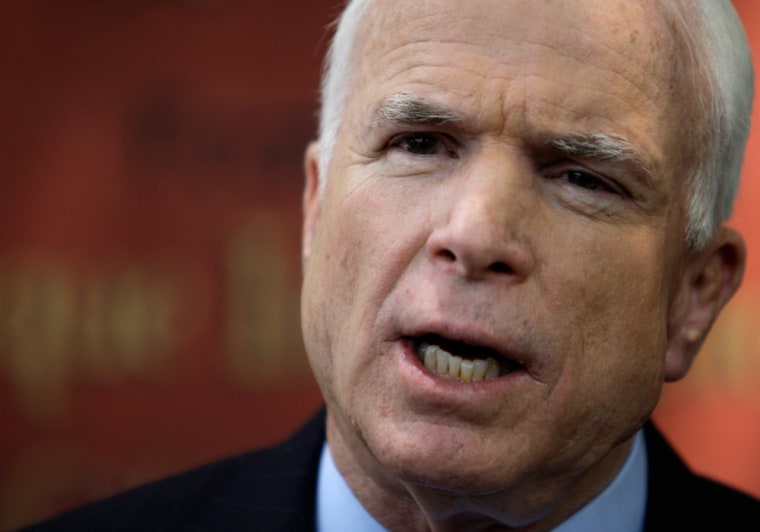Those who were watching the McCain campaign closely last week saw something new from the Arizona senator: a consistent message.
For weeks, John McCain has been playing message defense, leaping from one talking point to another as he reacted to the news of the day. But last week, the presumptive Republican presidential nominee gave the same speech on three consecutive days, painting a picture of Democrat Barack Obama using consistent language on visits to key swing states. His campaign even released a new commercial that meshed with his message.
"Sen. Obama is an impressive speaker, and the beauty of his words has attracted many people, especially among the young, to his campaign," McCain told an audience in Sparks, Nev., last Tuesday. "I applaud his talent and his success. ... My concern with Sen. Obama is that on big issues and small issues, what he says and what he does are often two different things, and that he doesn't seem to understand that the policies he offers would make our problems harder, not easier, to solve."
At a small fundraiser in Missouri the next day, McCain told a crowd of donors virtually the same thing, even throwing in a nod to former Clinton supporters: "My opponent is a great speaker, and he has been able to motivate millions of young people, including defeating a very formidable candidate in the form of Sen. Hillary Clinton."
While visiting Wagner Equipment in Aurora, Colo., McCain told employees, "The bottom line is that Sen. Obama's words, for all their eloquence and passion, don't mean all that much, and that's the problem with Washington. It's not just the Bush administration and it's not just the Democratic Congress. It's that everyone in Washington says whatever it takes to get elected, or... score the political points of the day."
This, McCain said, raises an important question about something at the very center of his opponent's campaign: "If Sen. Obama doesn't have the strength to speak openly and directly about how he will address the serious challenges confronting America, how will he be strong enough to really change Washington? We don't need another politician in Washington who puts self-interest and political expediency ahead of problem-solving."
These lines, repeated over and over again, were meant to drive home the message that Obama is a typical politician, more flair than substance. While acknowledging his opponent's oratorical gifts, McCain's implication is that older, more responsible voters should be able to see through the rhetoric to the "self-interest" underneath.
To back up his words, McCain's campaign released a television ad called "Celeb" meant to show that the excitement surrounding Obama (as illustrated by images of his speech in Berlin last month) is based more on "celebrity" than on his qualifications for the presidency. According to one campaign adviser, comparing Obama to media-created celebrities Paris Hilton and Britney Spears lays the foundation for a larger argument that McCain will continue to make on the stump: Obama's words are empty and his resume is sparse. The perception in the McCain camp is that Obama struggled toward the end of the Democratic primaries as voters began to doubt his preparedness, a sentiment that McCain now hopes to capitalize on.
Despite criticism of the ad, McCain's campaign defended the new tack, and at a town hall two days after its release, the candidate himself said he was "proud" of his new commercial.
On a conference call meant to explain the intent of "Celeb," McCain's senior adviser and top strategist, Steve Schmidt, called Obama supporters "fans" and said that "it's beyond dispute that he has become the biggest celebrity in the world."
On the same call, McCain campaign manager Rick Davis said, "I'd love to think that John McCain was a big international celebrity, but he's not.... We see him more as a global leader than a global celebrity."
Later in the week, another McCain senior adviser, Nicolle Wallace, explained that beyond using "humor" to redefine the Democratic senator, the ad was also intended to reassure McCain supporters who might be dispirited by images of Obama's success.
"The more serious point, I think, for our supporters is that despite the size of his crowds, celebrity and curiosity and fans, there's nothing to be intimidated by as the underdog campaign," Wallace said. "As the underdog campaign, sometimes our crowds aren't 200,000 strong and roaring, but that it's just a different approach and style and imagery, and we're holding our own."
The emergence of a consistent line of attack out of the McCain campaign has been heartening for a staff that has often felt slighted by the media. But the question remains whether McCain's newly focused narrative will stick. In an election where voters are itching for change, the difference between "no experience" and "a fresh face" is all perception.
